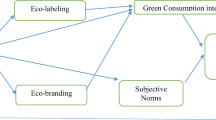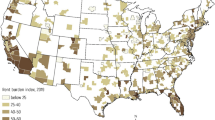Abstract
This paper examines both theoretically and empirically the link between pro-social behaviours, individual attitudes regarding waste prevention and disposal, and individual recycling behaviour in Italy at the end of the 1990s, in a period in which policy makers started to make the population aware of the importance of waste prevention, disposal and recycling. In the theoretical framework, following Czajkowski et al. (Environ Resour Econ 66:647–670, 2017), we develop a utility function that represents the individual level of satisfaction, which is influenced by certain aspects related to environmental quality. In the empirical analysis, using the 1998 wave of the multipurpose household survey (MHS) conducted by the Italian Central Statistical Office and probit models, we show a positive relationship between pro-social behaviours, waste concern and recycling behaviour that is robust to the inclusion of social capital variables.
Similar content being viewed by others
Notes
The points of reference for warm-glow are Deci (1971) in the psychology literature and Andreoni (1990) from the economics literature. According to Deci (1971), warm-glow means that an individual is motivated to perform an activity when he/she receives no apparent reward except the activity itself. In the model of Andreoni (1990), warm-glow means that the individual’s utility is not just a function of the consumption of the private and public goods but also of the individual’s contribution to the public good itself. This is commonly referred to as the “warm-glow” effect and describes a form of impure altruism (Daube and Ulph 2016).
Social capital is usually referred to as “features of social organization such as networks, norms and social trust that facilitate coordination and cooperation for mutual benefit” (Putnam 1995, 65).
3Unlike the contributions in question, we do not formalize self-image but introduce into the theoretical model other aspects that influence environmental quality.
4 We differentiate Eq. (3.3) in order to obtain the marginal increase for each ideal contribution.
References
Abbott A, Nandeibam S, O’Shea L (2013) Recycling: social norms and warm-glow revisited. Ecol Econ 90:10–18
Agovino M, Garofalo A, Mariani A (2016) Effects of environmental regulation on separate waste collection dynamics: empirical evidence from Italy. J Clean Product 124:30–40
Alpízar F, Gsottbauer E (2015) Reputation and household recycling practices: field experiments in Costa Rica. Ecol Econ 120:366–375
Andreoni J (1990) Impure altruism and donations to public goods: a theory of warm-glow giving. Econ J 100:464–477
Arbués F, Villanúa I (2016) Determinants of behavior toward selective collection of batteries in Spain. A bivariate probit model, Resources. Conserv Recycl 106:1–8
Becker GS (1965) A theory of the allocation of time. Econ J 75(299):493–517
Berglund C (2006) The assessment of households’ recycling costs: the role of personal motives. Ecol Econ 56:560–569
Berglund C, Söderholm P (2003) An econometric analysis of global waste paper recovery and utilization. Environ Resour Econ 26:429–455
Brekke KA, Kverndokk S, Nyborg K (2003) An economic model of moral motivation. J Public Econ 87:1967–1983
Brekke KA, Kipperberg G, Nyborg K (2010) Social interaction in responsibility ascription; the case of household recycling. Land Econ 86:766–784
Bucciol A, Montinari N, Piovesan M (2015) Do not trash the incentive! Monetary incentives and waste sorting. Scand J Econ 117:1204–1229
Callan SC, Thomas JM (1997) The impact of state and local policies on the recycling effort. East Econ J 23:411–423
Cecere G, Mancinelli S, Mazzanti M (2014) Waste prevention and social preferences: the role of intrinsic and extrinsic motivations. Ecol Econ 107:163–176
Collins A, O’Doherty R, Snell MC (2006) Household participation in waste recycling: some national survey evidence from Scotland. J Environ Plan Manage 49:121–140
Crociata A, Agovino M, Sacco PL (2015) Recycling waste: does culture matter? J Behav Exp Econ 55:40–47
Czajkowski M, Kadziela T, Hanley N (2014) We want to sort! Assessing households’ preferences for sorting waste. Resour Energy Econ 36:290–306
Czajkowski M, Hanley N, Nyborg K (2017) Social norms, morals and self-interest as determinants of pro-environmental behaviours: the case of household recycling. Environ Resour Econ 66:647–670
Daube M, Ulph D (2016) Moral behaviour, altruism and environmental policy. Environ Resour Econ 63:505–522
Deci EL (1971) Effects on externally mediated rewards on intrinsic motivation. J Pers Soc Psychol 18:105–115
Decreto Legislativo 5 febbraio 1997 numero 22. Gazzetta Ufficiale della Repubblica Italiana n. 38 del 15/02/1997. Supplemento Ordinario n.33
Dijkgraaf E, Gradus RHJM (2004) Cost savings in unit-based pricing of household waste. The case of the Netherlands. Resour Energy Econ 26:353–371
Dijkgraaf E, Gradus RHJM (2009) Dynamics of unit-based pricing systems and environmental activism. Resour Energy Econ 31:13–23
Fiorillo D (2013) Household waste recycling: national survey evidence from Italy. J Environ Plan Manage 56:1125–1151
Fullerton D, Kinnaman TC (1996) Household responses to pricing garbage by the bag. Am Econ Rev 86:971–984
Hage O, Soderholm P, Berglund C (2009) Norms and economic motivation in household recycling: empirical evidence for Sweden. Resour Conserv Recycl 53:155–165
Halvorsen B (2008) Effects of norms and opportunity cost of time on household recycling. Land Econ 84:501–516
Hong S, Adams RM, Love HA (1993) An economic analysis of household re cycling of solid wastes: the case of Portland, Oregon. J Environ Econ Manag 25:136–146
Hornik J, Cherian J, Madansky M, Narayana C (1995) Determinants of recycling behavior: a synthesis of research results. J Socio-Econ 24:105–127
Huang JC, Halstead JM, Saunders SB (2011) Managing municipal solid waste with unit- based pricing: policy effects and responsiveness to pricing. Land Econ 87:645–660
Istituto Nazionale di Statistica (ISTAT) (1998) Indagine MULTISCOPO sulle famiglie, aspetti della vita quotidiana. Istituto Nazionale di Statistica (ISTAT), Rome
Jenkins RR, Martinez SA, Palmer K, Podolsky MJ (2003) The determinants of household recycling: a material-specific analysis of recycling program features and unit pricing. J Environ Econ Manag 45:294–318
Kinnaman TC, Shinkuma T, Yamamoto M (2014) The socially optimal recycling rate. J Environ Econ Manag 68:54–70
Kipperber G (2007) A comparison of household recycling behaviors in Norway and the United States. Environ Resour Econ 36:215–235
Nicolli F, Mazzanti M (2011) Diverting waste: the role of innovation. In: OECD (ed) Invention and transfer of environmental technologies. OECD, Paris
Nyborg K (2011) I don’t want to hear about it: rational ignorance among duty-oriented consumers. J Econ Behav Organ 79(3):263–274
Nyborg K, Howarth RB, Brekke KA (2006) Green consumers and public policy: on socially contingent moral motivation. Resour Energy Econ 28:351–366
Owen AL, Videras JR (2006) Civic cooperation, pro-environmental attitudes, and behavioural intentions. Ecol Econ 58:814–829
Owen AL, Videras JR (2007) Culture and public goods: the case of religion and the voluntary provision of environmental quality. J Environ Econ Manag 54:162–180
Pearce DW (2004) Does European Union waste policy pass a cost-benefit test? World Econ 15:115–137
Pretty J (2003) Social capital and the collective management of resources. Science 302:1912–1914
Putnam RD (1995) Bowling alone: America’s declining social capital. J Democr 6:65–78
Schultz PW, Oskamp S, Mainieri T (1995) Who recycles and when? A review of personal and situational factors. J Environ Psychol 15:105–121
Sidique SF, Lupi F, Joshi SV (2010) The effects of behavior and attitudes on drop-off recycling activities. Resour Conserv Recycl 54:242–249
Tabernero C, Hernández B, Cuadrado E, Luque B (2015) A multilevel perspective to explain recycling behavior in communities. J Environ Manage 159:192–201
Tadesse T (2009) Environmental concern and its implication to household waste separation and disposal: evidence from Mekelle, Ethiopia. Resour Conserv Recycl 53:183–191
Thogersen J (1996) Recycling and morality. A critical review of the literature. Environ Behav 26:536–558
Thomas C, Sharp V (2013) Understanding the normalisation of recycling behaviour and its implications for other pro-environmental behaviours: a review of social norms and recycling. Resour Conserv Recycl 79:11–20
Torgler B, García-Valinas MA (2007) The determinants of individuals’ Attitudes towards preventing environmental damage. Ecol Econ 63:536–552
Van den Bergh JCJM (2008) Environmental regulation of households: an empirical review of economic and psychological factors. Ecol Econ 66:559–574
Vicente-Molina M, Fernández-Sáinz A, Izagirre-Olaizola J (2013) Environmental knowledge and other variables affecting pro-environmental behaviour: comparison of university students from emerging and advanced countries. J Clean Prod 61:130–138
Videras J, Owen AL, Conover E, Wu S (2012) The influence of social relationships on pro-environment behaviors. J Environ Econ Manag 63:35–50
Author information
Authors and Affiliations
Corresponding author
Additional information
Publisher's Note
Springer Nature remains neutral with regard to jurisdictional claims in published maps and institutional affiliations.
About this article
Cite this article
Fiorillo, D., Senatore, L. Pro-social behaviours, waste concern and recycling behaviour in Italy at the end of the 1990s. Environ Econ Policy Stud 22, 127–151 (2020). https://doi.org/10.1007/s10018-019-00251-9
Received:
Accepted:
Published:
Issue Date:
DOI: https://doi.org/10.1007/s10018-019-00251-9




